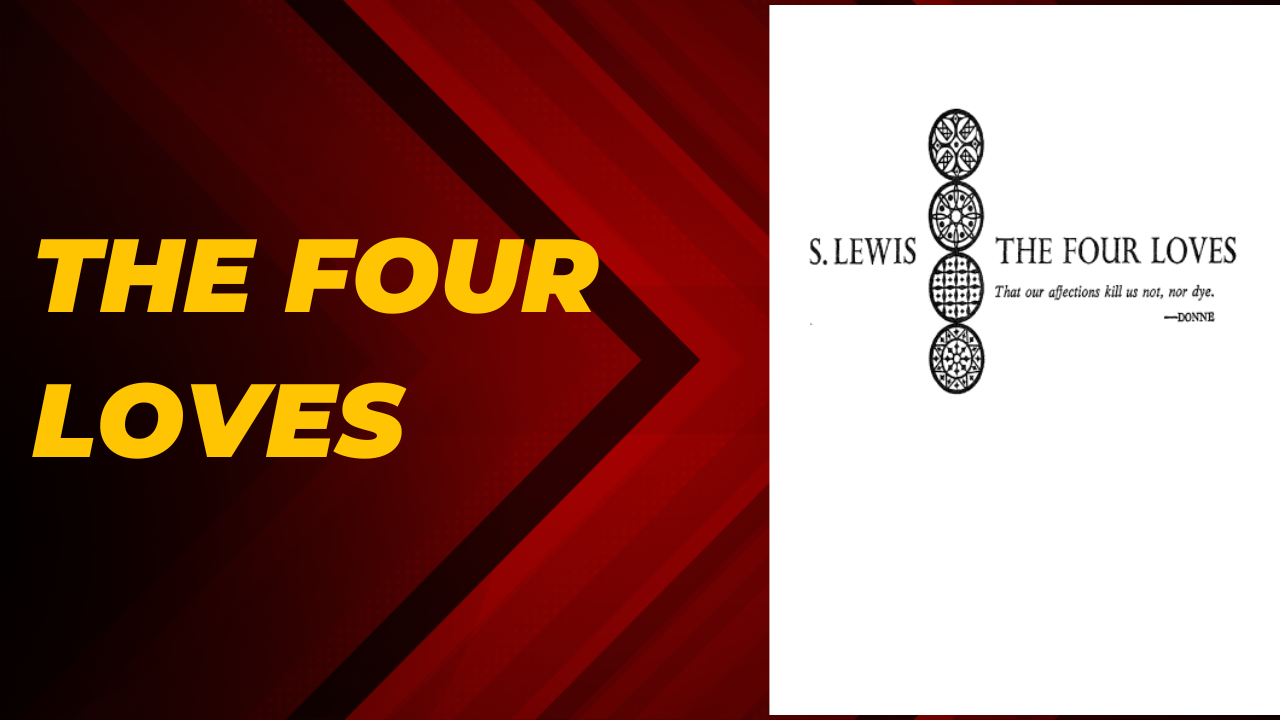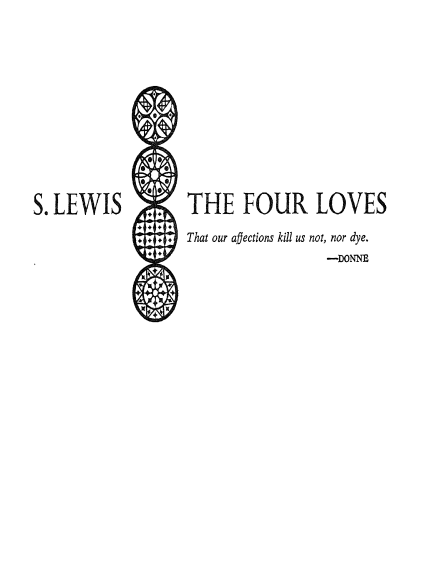
This excerpt from C.S. Lewis’s The Four Loves expands on four types of love: Need-love, Gift-love, Affection, and Friendship. Lewis analyzes the nature of each, exploring their strengths and weaknesses, and how they can be both sources of joy and potential pitfalls. He examines how these loves interact with each other and with spiritual love, emphasizing the importance of balance and the dangers of idolatry. Finally, Lewis discusses the necessary transformation of natural loves into Charity to achieve spiritual fulfillment.


The Four Loves by C.S. Lewis
- What is the distinction between “Need-pleasures” and “Pleasures of Appreciation”?
- Need-pleasures are those that arise from fulfilling a basic need or alleviating a discomfort, such as the pleasure of drinking when thirsty or eating when hungry. They tend to be very intense in the moment of satisfaction, but they fade quickly. Pleasures of Appreciation, on the other hand, arise from the recognition of and engagement with the inherent qualities of something, like enjoying a fine wine or listening to beautiful music. These pleasures are not directly tied to a need, and tend to be more enduring and offer a sense of unselfishness.
- How does C.S. Lewis categorize the different kinds of love and what makes each unique?
- Lewis identifies four loves: Affection, Friendship, Eros, and Charity. Affection is a love that often exists within a familial or familiar setting, characterized by comfort and a sense of “being at home” with another. Friendship is a bond built on shared interests, values, and the recognition of a common vision of truth, often described as a “meeting of minds.” Eros, in its purest form, is a desire for the whole of the beloved person, transcending mere sexual desire. Charity, or divine love, is a selfless, unconditional love that seeks the good of the other, and ultimately stems from God’s love for humanity. Each love has its own unique essence, its own needs, and its own expressions, ranging from a basic sense of comfort to a divine and selfless desire for the ultimate good.
- What is the role of “Need-love” and “Gift-love” in Lewis’s framework?
- Need-love is a love based on what one receives from the other, similar to a child’s love for a parent, or one’s love for a need-pleasure. Gift-love is the kind of love that desires to give and serve another, reflecting God’s own loving nature. Lewis argues that both Need-love and Gift-love are present in human relationships. Need-love should not be seen as inherently bad; rather, it is an aspect of our nature that can be transformed and made purer when guided by Gift-love, especially in the context of a loving relationship with God.
- How does Lewis view patriotism, and what are the potential dangers associated with it?
- Lewis distinguishes between a healthy patriotism, which he sees as an affection for one’s own country and community, and a more dangerous form that believes in one’s nation’s inherent superiority to all others. This latter form can lead to arrogance, hatred, and the justification of atrocities. Lewis argues that while love for one’s own is natural, it can be distorted if it lacks humility and the understanding that other nations and people are equally valuable in God’s eyes.
- How does Affection operate within a family or close-knit community, and what are its potential pitfalls?
- Affection, as a love, is characterized by familiarity and comfort. It finds its roots in family life and the everyday, mundane moments shared by people in the same household or community. Lewis highlights its tendency to unite people who might otherwise not choose each other as companions, leading to the discovery of the unique worth of others in their own way. A pitfall is that Affection can be possessive and demanding, creating smothering relationships. Additionally, it can lead to jealousy, especially when a loved one forms new connections or interests outside the family.
- What makes Friendship unique from the other loves and what makes it both a potential good and a potential danger for society?
- Friendship is a love based on a shared vision of truth, often discovered in moments of shared understanding (“What! You too?”). It is characterized by a focus on the inner person, or “naked personality,” rather than external factors like social status. As a positive force, Friendship allows individuals to grow intellectually and spiritually, but it can also be dangerous as it can create an exclusive circle that discounts the opinions of the outside world, leading to elitism or moral blindness. It has little or no “survival value” but great “civilization value”.
- How does Lewis differentiate between Eros and Venus, and what are some of the potential pitfalls of Eros?
- Lewis sees Eros as a deep, whole-person love directed towards the beloved as a unique individual, not simply the desire for sexual pleasure. He refers to the carnal or purely sexual element within Eros as Venus. A key difference is that, where Eros wants the Beloved, Venus wants the thing itself, the sensory pleasure. A pitfall of Eros, according to Lewis, is that it can become its own religion, causing lovers to disregard external duties and obligations in the name of their love. They might come to see their sacrifices as acts of piety to Eros, despite the damage they do to other relationships or the outside world.
- What is Charity, how does it relate to the other loves, and why does Lewis say we need it?
Charity, or divine love, is the unconditional and selfless love that originates from God. It is primarily Gift-love, an outpouring of divine goodness. It is a transformative force that can heal the distortions in other forms of love and enable us to love others in spite of our imperfections. Lewis suggests that all natural loves, including Affection, Friendship, and Eros, are incomplete and can become distorted or selfish without the influence of Charity. He emphasizes that our capacity for Charity depends entirely on God’s grace, which transforms not only our Gift-love, but also our Need-love, allowing us to accept our inherent dependence on God and to see and love others as He does, even in the face of our own limitations and the flaws of others.
The Four Loves: A Study Guide
Quiz
- According to Lewis, what is the difference between “static” nearness and nearness in terms of progress using the analogy of a detour? Static nearness refers to the physical distance between two points, while nearness in terms of progress refers to the advancement of one’s goal or destination, even if physically further away. Lewis uses a detour to illustrate that one may be further away but yet nearer the goal.
- Explain Lewis’s distinction between Need-pleasures and Pleasures of Appreciation, and give an example of each. Need-pleasures are those that arise from satisfying a bodily need, such as quenching thirst. Pleasures of Appreciation involve a recognition of the inherent goodness or value of something outside oneself, such as enjoying fine wine.
- What does Lewis mean when he states that Need-loves will not last longer than the need? Need-loves are like Need-pleasures in that they are dependent on our need or lack for the object of the love. Once that need is satisfied, the love wanes or disappears.
- How do nature lovers differ from botanists or those who simply appreciate beauty? Nature lovers seek to absorb the sheer quality of nature into themselves, rather than focusing on specific beautiful objects or scientific details, allowing themselves to be colored by the experience.
- According to Lewis, what is the danger of demoniac patriotism and how does it relate to wars of annihilation? Demoniac patriotism is the belief that one’s own nation is inherently superior, leading to a false transcendence and the idea that one’s country’s cause is God’s cause. This may lead to extreme wars to obliterate other nations because they’re believed to be evil.
- What is the special glory of Affection, according to Lewis? The special glory of Affection lies in its ability to unite people who are otherwise very different or who would not naturally be drawn to one another, teaching them that there’s good in everyone.
- How does Lewis differentiate between Affection and Friendship? Affection arises from familiarity and shared context, like family or household, whereas Friendship is born of discovering a shared vision or truth. Friendship also transcends any need to “be needed” that may exist in Affection.
- According to Lewis, what are the qualities that a man looks for in a friend and is it the same for a woman? Lewis suggests that men and women look for companionship, shared vision and common interests, and similar tastes in a friend. He notes, however, that this dynamic is disrupted in many modern contexts where the sexes don’t share similar experiences or intellectual pursuits.
- How does Lewis define “Eros”? Eros, as defined by Lewis, is the kind of love that lovers are “in,” characterized by a strong desire for a specific person and a pre-occupation with the beloved. It goes beyond mere sexual desire (which Lewis terms Venus).
- Explain the difference between idolatry of the beloved and idolatry of Eros, according to Lewis. The idolatry of the beloved is to see your partner as a god, while idolatry of Eros is the worship of romantic love itself as a god. Lewis sees the latter as more likely, where the actions of those who worship Eros become a kind of “new religion.”
Answer Key
- Static nearness refers to the physical distance between two points, while nearness in terms of progress refers to the advancement of one’s goal or destination, even if physically further away. Lewis uses a detour to illustrate that one may be further away but yet nearer the goal.
- Need-pleasures are those that arise from satisfying a bodily need, such as quenching thirst. Pleasures of Appreciation involve a recognition of the inherent goodness or value of something outside oneself, such as enjoying fine wine.
- Need-loves are like Need-pleasures in that they are dependent on our need or lack for the object of the love. Once that need is satisfied, the love wanes or disappears.
- Nature lovers seek to absorb the sheer quality of nature into themselves, rather than focusing on specific beautiful objects or scientific details, allowing themselves to be colored by the experience.
- Demoniac patriotism is the belief that one’s own nation is inherently superior, leading to a false transcendence and the idea that one’s country’s cause is God’s cause. This may lead to extreme wars to obliterate other nations because they’re believed to be evil.
- The special glory of Affection lies in its ability to unite people who are otherwise very different or who would not naturally be drawn to one another, teaching them that there’s good in everyone.
- Affection arises from familiarity and shared context, like family or household, whereas Friendship is born of discovering a shared vision or truth. Friendship also transcends any need to “be needed” that may exist in Affection.
- Lewis suggests that men and women look for companionship, shared vision and common interests, and similar tastes in a friend. He notes, however, that this dynamic is disrupted in many modern contexts where the sexes don’t share similar experiences or intellectual pursuits.
- Eros, as defined by Lewis, is the kind of love that lovers are “in,” characterized by a strong desire for a specific person and a pre-occupation with the beloved. It goes beyond mere sexual desire (which Lewis terms Venus).
- The idolatry of the beloved is to see your partner as a god, while idolatry of Eros is the worship of romantic love itself as a god. Lewis sees the latter as more likely, where the actions of those who worship Eros become a kind of “new religion.”
Essay Questions
- Explore the relationship between Need-love and Gift-love as presented by Lewis. How do these concepts relate to both human and divine love?
- Lewis suggests that Friendship is “unnecessary.” Analyze what he means by this and how this concept shapes his understanding of the nature of true friendship.
- According to Lewis, how does Eros differ from Venus, and what dangers arise from a misunderstanding or misuse of this distinction?
- Discuss Lewis’s view on the role of ritual and play in Eros. How do these elements contribute to his understanding of healthy relationships?
- Lewis contends that all human loves, including Eros, must be “ruled” by Charity. Explain this concept, and analyze how it applies to the different types of love he discusses in the book.
Glossary of Key Terms
- Need-pleasures: Pleasures that arise from satisfying a bodily need, such as hunger or thirst.
- Pleasures of Appreciation: Pleasures that come from recognizing the inherent goodness or value of something outside oneself, like art or nature.
- Need-loves: Loves that are based on needing the other person, like the need for a specific person to fulfill some need.
- Gift-loves: Loves that are based on giving or sharing of self, without expectation of receiving.
- Demoniac patriotism: The belief that one’s own nation is superior, leading to a false transcendence and the idea that the nation’s cause is the cause of God.
- Affection: A familiar love, based on shared experiences and proximity, often found in families and households.
- Friendship: A love based on a shared vision or truth, often arising between companions with a common interest.
- Eros: A romantic love characterized by a strong desire for a specific person, and a preoccupation with the beloved, beyond just physical attraction.
- Venus: The purely sexual aspect or desire within Eros that is more of a physical drive than a love for another person.
- Charity: A divine love, which is seen as the ultimate form of Gift-love, and is the basis for all other loves.
- Static Nearness: The physical distance between two objects.
- Nearness in terms of progress: The advancement towards a goal, even if physically further away at a given time.






















0 responses on "The Four Loves"